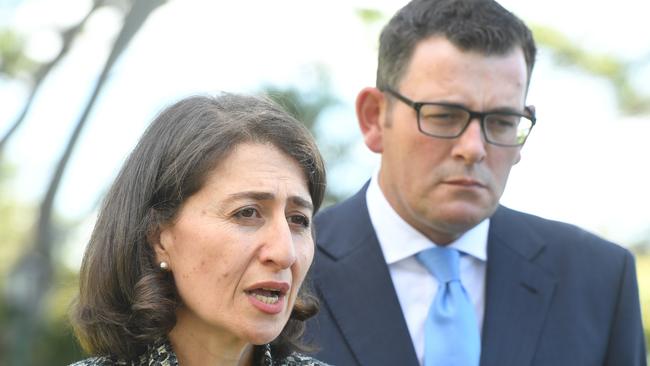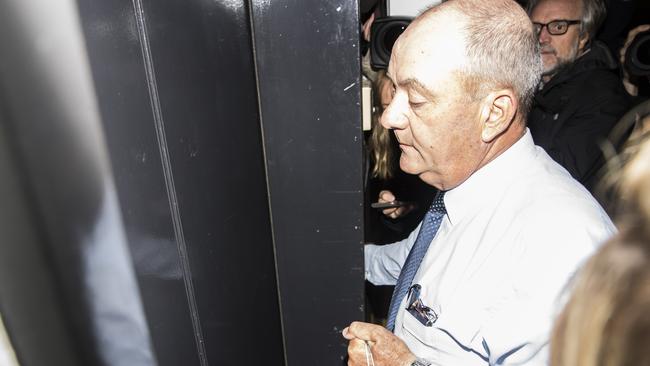Berejiklian and Andrews: A tale of two crises


Meanwhile, with Victoria’s governance crisis dragging on, Chris Eccles, the state’s most senior public servant, resigned as his phone records contradicted the evidence he gave the inquiry into the hotel quarantine program.
Adding to the damage, Andrew Crisp, Victoria’s emergency management commissioner, sought to drastically revise his evidence to the Public Accounts and Estimates Committee, seemingly so as to avoid contradicting Lisa Neville, Victoria’s Police Minister.
Not least because they were entirely unexpected, Berejiklian’s woes caused the profoundest shock. It is a law of life, harsh as it is just, that the fall from grace is greater, the higher the altitude from which it begins. And in Berejiklian’s case, those heights had reached enviable peaks.
Yet, unlike Americans, whose aspirations for their leaders were shaped by the aura of the nation’s noblest figures, Australians have never believed that politicians should be exemplars of human virtue. Heeding the sage advice William Godwin gave, more than two centuries ago, to those who claimed governments could act as teachers of morality — that ‘‘it is to be hoped mankind will never have to learn so important a lesson through so incompetent a channel” — we are, by and large, content when politics provides us not with saints but with leaders of passable character and reasonable ability. And we also recognise, perhaps better than Americans do, that so as to avoid unduly narrowing the field from which public officials are drawn and inflicting gratuitous emotional pain on them and their families, politicians have as much right to privacy as anyone else, except when infringing on that privacy is vital for holding them to account.
The crucial question then is not whether Berejiklian’s conduct was ethically commendable or even vaguely sensible; it is whether she breached the standards we impose on our political leaders — standards which, above and beyond the obligation to respect the law, include duties of prudence and integrity.
At least so far, the evidence points to an almost bewildering lack of judgment, rather than to those standards being breached. No doubt, Berejiklian’s critics will interpret her not wanting to know about Maguire’s dealings as just a ploy; others will view those statements as asserting that they had separate lives. Either way, she was clearly aware of his longstanding financial difficulties and yet strenuously denies ever having used her powers as Premier on his behalf. If her contentions are correct, there was no abuse of office, obstruction of justice or dereliction of duty, other than of the obligation, which every public official has, to avoid scandals that undermine the effectiveness of government.

Whether new evidence changes that assessment remains to be seen. However, what is certain, on the copious material that is already in the public domain, is that the Victorian situation is altogether more serious.
There is, to begin with, the ever starker tension between the emerging factual record and the Premier’s daily press conference, at which Dan Andrews routinely denies any involvement in, or even knowledge of, the fateful decisions. It may be that candour has never been a requirement for high office; it is, however, one thing to equivocate for reasons of state, and quite another to do so out of base self-preservation. Compounding the doubts about the Premier’s sincerity are the equally routine apologies. Forever wearily aggrieved, he presents himself as always more sinned against than sinning, yet unceasingly willing to bear the cross — but never to the point of resigning.
Listening to his statements of contrition, it is hard not to be reminded of Claudius, the fraudulent repenter in Shakespeare’s Hamlet, who, in seeking absolution without offering to incur any of its pain, asks, as if entirely innocently, “may one be pardoned and retain the (fruits of the) offence?”
However, the most troubling feature of the Victorian situation, and the one which most sharply distinguishes it from the turmoil in NSW, is the systemic nature of the moral gangrene the crisis has uncovered.
In effect, it is not merely the Premier who has denied culpability; it is literally each and every minister, department head and department, with the final submissions that have now been made to the inquiry abjuring ultimate responsibility for the errors that cost hundreds of lives.
Nor is it merely the Premier who made no effort to thoroughly reconstruct the sequence of events; as is apparent from their failure to consult their phone records until they were forced to do so, it is all of the ministers and senior officials the crisis has embroiled. As a result, it is not merely truth-telling that has vanished as a social value in the Victorian public sector, it is the commitment to truth-finding, without which truth and truthfulness cannot survive.
And as if that were not enough, the fact that until Peta Credlin pressed the issue at the Premier’s press conferences, the inquiry did not seek the telephone records — and even then, only sought them selectively — must raise serious concerns about the inquiry’s willingness to penetrate Victoria’s heart of darkness.
There is, consequently, a real risk that the system of power Andrews has built up will emerge fundamentally unscathed. In contrast, Berejiklian, whose errors pale by comparison, looks increasingly likely to be crushed, as were Nick Greiner and Barry O’Farrell before her, in NSW’s far more intrusive anti-corruption process — a process which seems designed to catch the guilty by flaying the innocent.
Unpleasant as that picture is, it would have come as no surprise to Machiavelli, with his harshly realistic assessment of politics and human frailty.
The tragedy of politics, he maintained, is not that Fortuna confronts leaders, buffeted by passions they can neither understand nor master, with the irreducible forces of chaos, fatality, necessity and ignorance.
It is that the whirlwind fortune’s forces unleash is most likely to spare the very worst of leaders: those who, by pervasively corrupting the polity, have erected the sturdiest shelter from the storm. And with all opposition sapped, the conditions for revolution, rather than ever becoming ripe, grow prematurely rotten, delivering the people gift-wrapped to its chronic abusers.
It may be that Machiavelli, living in a world of petty tyrannies and ruthless oligarchies, was too pessimistic. For all its flaws, Australian democracy has shown a remarkable capacity to turn on bad governments from both sides of politics, often with surprising vehemence and rapidity.
Today, the dissenting voices which presage that turn are a distant rumble; tomorrow, they deserve to be an overwhelming roar.






The past week has hardly been kind on our political system’s image. In NSW, Gladys Berejiklian’s previously untarnished reputation was battered by revelations of her relationship with Daryl Maguire, a disgraced former Liberal MP.